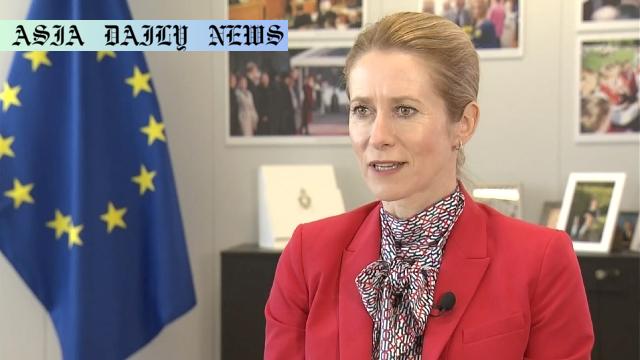Ukraine can be supported to end Russia’s aggression with EU and US cooperation, including sanctions and dual-use goods restrictions.

Introduction: The Commitment to Pressuring Russia
In light of the ongoing Russia-Ukraine war, global political dynamics are undergoing significant shifts. Among the central figures addressing this issue is Kaja Kallas, the European Union’s foreign policy chief. Kallas has emphasized the importance of a consolidated and united front by the European Union (EU) and the United States in their support for Ukraine. This collective approach is targeted at pushing Russia into negotiating a ceasefire while ensuring stability in the region. As Russia continues its aggression, the roles of sanctions, military aid, and geopolitical signaling have taken center stage in the global discussion.
The US and EU’s Unified Strategy for Ukraine
A pivotal part of the EU-US strategy lies in sending unwavering signals of solidarity to Ukraine. Kallas, during her interview, expressed optimism about the United States’ decision to provide more advanced weapons through NATO. She viewed this strategic move as an essential facet of deterring Russia. Furthermore, Kallas highlighted the necessity of sanctions and higher tariffs on Russia to cut off substantial economic resources fueling the war. Such sanctions aim to hamstring Moscow’s military capabilities while showcasing the long-term resilience of the Western alliance.
China’s Position Further Complicates the Conflict
The geopolitical implications of the Ukraine conflict extend beyond Europe and the United States, drawing in significant global players such as China. When questioned about reports of Chinese Foreign Minister Wang Yi’s remarks, Kallas confirmed his statement regarding Beijing’s concern over Russia losing the conflict. This acknowledgment underscores the intricate balancing act for global players like China, which could potentially exacerbate or de-escalate the conflict based on its foreign policy decisions. Furthermore, Kallas reiterated the need to monitor China’s possible provision of dual-use goods to Russia, which could indirectly support the latter’s war efforts.
Strengthening Global Partnerships Amid Challenges
Aside from addressing the war, Kallas took the opportunity to underscore the strategic relationship between the EU and Japan. Labeling the two as “like-minded partners,” she called for bolstered cooperation across economic, technological, and geopolitical spheres. Such alliances are crucial in responding to multipronged threats posed by global conflicts, economic disruptions, and the changing world order. A stronger EU-Japan alliance further complements the broader efforts undertaken by Western powers to stabilize the situation with comprehensive and sustained international cooperation.
Conclusion: A Calculated Path Forward
The Ukraine conflict serves as a stark reminder of how territorial aggression can unsettle global stability. The EU and US leadership, as underscored by Kallas, demonstrates a commitment to long-term support for Ukraine. Their actions range from military and economic measures to a strategic alignment of regional partnerships with nations such as Japan. However, the response to Chinese support for Russia remains a significant challenge, given the complex dynamics between the West, Russia, and China. The urgency of these measures is evident, as they aim to shift Russia’s calculus and ultimately pressurize it into negotiating a ceasefire. Moving forward, concerted efforts must focus on combining strategic sanctions, well-timed military support, and a robust alliance amongst global key players.
Commentary
Global Cooperation: A Crucial Key
The Ukraine war has been an eye-opener in understanding the value of international cooperation during times of crisis. Kaja Kallas’s strategy highlights the importance of a unified approach between the US and EU to limit further violence in Ukraine. Such unity serves as a significant deterrence to aggressor nations as it demonstrates collective resistance that is difficult to outlast.
Sanctions: A Strong Economic Tool
The proposal for stricter sanctions and tariffs against Russia paints a clear picture of what can be achieved when economic tools are wielded effectively. By depriving Russia of funding, these measures aim to weaken its ability to sustain prolonged military operations. However, enforcing sanctions requires careful monitoring to ensure effectiveness and avoid unintentional consequences for neighboring countries or vulnerable populations.
China’s Role: An Intriguing Angle
China’s influence on the conflict adds a layer of complexity. Wang Yi’s remarks about opposing a Russian loss reveal Beijing’s concern about being the next target of Western pressure. While these concerns are valid from China’s perspective, they raise questions about the moral and political responsibilities of non-Western powers in global conflicts. Kallas’s focus on eliminating dual-use goods shipments to Russia reflects the necessity of curbing indirect support to aggressor nations.
Conclusion: A Global Consensus is Required
As the war continues, Kallas’s remarks serve as a reminder of the importance of multilateralism in confronting modern-day geopolitical crises. Strengthening cooperation, enforcing effective sanctions, and addressing indirect support for aggressors are vital steps toward a peaceful resolution. While challenges remain, the strategies proposed show promise in creating a global response that not only defends Ukraine but also molds a future where such conflicts are less likely to arise.


